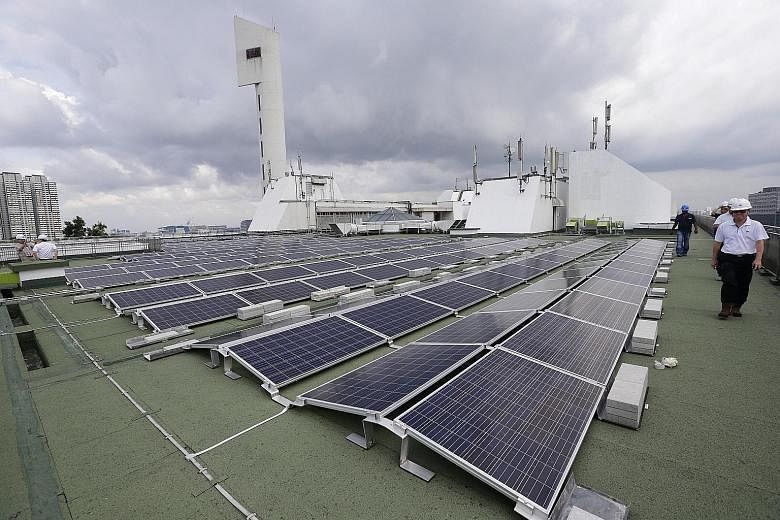Power firm Sun Electric has won the first contract allowing solar energy to be fully exported to Singapore's electricity grid.
The agreement announced yesterday involves Sun Electric renting rooftop space on 27 JTC buildings to install solar panels capable of generating up to 5 megawatt-peak (MWp) of electricity. These panels will be rolled out over the course of a year and Sun Electric will own all the power generated.
Power generated under existing solar leasing models primarily serves users of the building itself, before excess energy goes to the grid.
The contract, which is for 15 years with a five-year renewal option, gives Sun Electric access to 43,000 sq m of roof space, with the possibility of it adding new JTC properties.
JTC hopes its SolarRoof programme will promote the adoption of solar energy here and allow the government agency to leverage roof space by renting it to solar power providers.
Occupants of buildings that have not been fitted with solar panels will also be able to buy energy from the provider.
Mr Mark Koh, director of facilities and estate management at JTC, said: "We hope that this model can be shared with other building owners."
Energy providers under the SolarRoof scheme must comply with all relevant regulations from other governing bodies such as the Building and Construction Authority and Energy Market Authority (EMA), said JTC, which may call more tenders in future.
EMA chief executive Ng Wai Choong said there has been a significant growth in market interest in green energy, with solar photovoltaic capacity tripling over the past three years to reach 129.8MWp in the first quarter of this year. Still, this represents but a small fraction of energy here. The Government aims to have 5 per cent of the country's electricity needs met by solar energy by 2020.
Mr Ng added: "We welcome innovative business models that meet the needs of different consumers. EMA will also continue simplifying rules and regulations to facilitate more solar deployment in Singapore."
Sun Electric's prices for solar power vary based on factors such as customer profile, consumption and contract length. Customers with certain two-year plans can generally expect to pay about 10 to 20 per cent less than the electricity tariff rate, said chief executive and founder Matthew Peloso.
JTC's Mr Koh said: "As the market matures, there could be better rates coming for the market."
He added that while providers here now sweeten the adoption of solar power with discounts, some companies elsewhere put a premium on solar power because of its environmentally friendly role. He said this opens the door for providers "to go more towards the mature markets", where it is a premium commodity.
Dr Peloso told The Straits Times: "We intend to support other cities or densely populated urban regions in South-east Asia and abroad to utilise this technology and commercial model, which was test-bedded and commercialised in Singapore, through expansion in the coming years."


